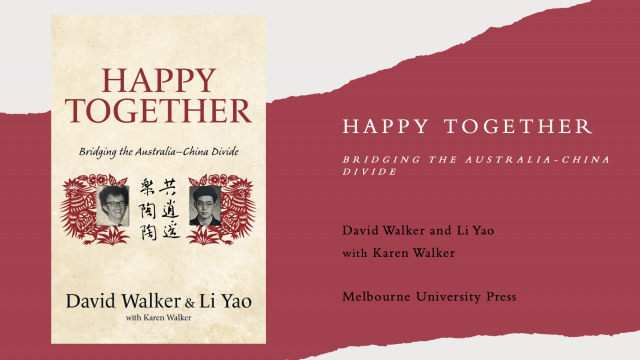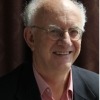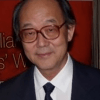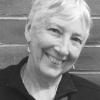New Book: Happy Together by David Walker and Li Yao with Karen Walker

Happy Together: Bridging the Australia-China Divide
David Walker, Li Yao, Karen Walker
Published by Melbourne University Press, 2022
A fresh perspective on the Australia-China relationship told through the lens of memoir, culture and friendship.
The publication of Happy Together, a collaboration between Australian and Chinese writers, is appearing in a year that marks the fiftieth anniversary of Australia’s recognition of the Peoples’ Republic of China.
David Walker AM is an Australian historian, a Fellow of the Academy of the Social Sciences in Australia and the Australian Academy of the Humanities. He has long been interested in Australia’s relations with Asia. His books in this area include Anxious Nation: Australia and the rise of Asia, 1850-1939 (1999); Australia’s Asia: from Yellow Peril to Asian Century (co-edited with Agnieszka Sobocinska, 2012); and Stranded Nation: White Australia in an Asian Region (2019). His general history of Australia (co-authored with Louise Johnson and Tanja Lukins) The Story of Australia: a new history of people and place appeared in 2022.
In 2013, supported by FASIC, David Walker took up an appointment as the inaugural BHP Chair of Australian Studies at Peking University. During his three-year stay in Beijing with his wife Karen, he met Professor Li Yao, a member of the Chinese Writers’ Association who has translated almost forty Australian books into Chinese. When Li Yao agreed to translate David’s book, Not Dark Yet: a personal history (2011) the two became very good friends. They discussed the translation while travelling extensively through China. When the translation was complete, Li Yao persuaded David that his next task should be a joint memoir telling their parallel life stories. The result is Happy Together: Bridging the Australia China divide.
Happy Together begins with the story of how the Li family travelled from their ancient home in Shanxi Province to Inner Mongolia when severe drought and a crippling famine struck northern China in the late nineteenth century. They began a new life farming the remote grasslands. In the first decades of the twentieth century, they prospered as landowners and teachers but could not escape the ravages of warlords, armies and revolutionaries. After 1949, in the New China, the ‘landlord hats’ and relative prosperity of Li Yao’s mother and father led to great personal suffering. Their children grew up in Mao’s China. Li Yao dreamt of becoming a writer, but those dreams were swept away by the Cultural Revolution. His story is interwoven with that of David Walker, who was born around the same time, but a world away. The Walkers had started their pioneering life in the remote near north of South Australia. Stephen FitzGerald, Australia’s first Ambassador to the PRC has called Happy Together: ‘A work of great ingenuity and fascination’ while the writer Alexis Wright calls it: ‘An inspiring and insightful story for our times’.
Quotes About the Book
‘As historian David Walker and translator Li Yao exchange their life histories, a fresh perspective on Walker’s longstanding interest in the Asia–Australia relationship emerges. Sometimes droll, often poignant, always engaging, Happy Together is a story of parallel lives, contrasting national histories and an enriching cross-cultural friendship.’
Graeme Davison, Emeritus Professor of History, Monash University
‘This is that rare book which gives a completely new perspective on a well-trodden subject— in this case Australia and China, in a work of great ingenuity and fascination. Our literature on this subject is full of Australian actors and China experts, but with Chinese actors barely visible. By contrast this contribution introduces two companion actors, an Australian, David Walker, and a Chinese expert on Australia, Li Yao, who has become not only an expert but a leaven in China–Australia cultural relations. In writing that is at times elegiac and very moving, Li Yao’s story evokes what it was actually like to be tossed in those violent political currents that tore China apart in the mid-twentieth century, to remain optimistic and emerge into a fulfilling and successful career. The ingenuity and impact of the book lies in the interweaving of Li Yao’s story with the counterpoint story of his fellow author, eminent historian and elegant writer David Walker, each story a metaphor for the vastly different histories of China and Australia over these last seventy years. Their relationship has become a catalyst for a ramifying array of other connections between China and Australia in the fields of writing, translation, publishing and historical research, a compelling story of the human and creative and happy relations that continue beneath the unhappy rhetoric of hostility and enmity of Australian politicians.’
Stephen FitzGerald, Australia’s first ambassador to PR China and author of Comrade Ambassador
‘In Happy Together we find that two academics of vastly contrasting upbringings—the South Australian-born David Walker and Li Yao who grew up in the turmoil of China’s Cultural Revolution—can still find much in common. In this lyrical and elegant telling of their life stories, written together with David’s wife Karen Walker, the “two Roosters” (both men were born in 1945) become the vessels through which we discover an Australia waking up to its place in Asia and a China undergoing a radical transformation. At several points, the lives of the scholarly Walker and the literary Yao cross—sometimes physically, such as when the pair embark on a trip through northern China together—or otherwise through shared experiences: both grew up in the countryside, with teachers for parents, and were bookworms from an early age. Occasionally the insertion of wry commentary creates a nexus between the men such as when David’s grandmother tells her daughter one child was enough, or as the authors call it “Glasson’s own one-child policy”. But it is also how their lives contrast that makes this book so compelling with the rarefied world of Australian academia serving as a dramatic foil to the political upheavals of 1960s China.’
Monica Tan, journalist and author of Stranger Country
‘This richly detailed memoir takes us on a remarkable journey through a tumultuous period of Chinese history. It is also an unforgettable celebration of a friendship between renowned scholar and gifted translator Li Yao, and David Walker, a distinguished Australian historian which bridges cultures, history and life experience. An inspiring and insightful story for our times, and all times.’
Alexis Wright, award-winning author of The Swan Book and Carpentaria
About Authors
David Walker is an Australian historian who holds Honorary Professorships at the University of Melbourne, Western Sydney University and Deakin University. From 2013–2016 he was the inaugural BHP Chair of Australian Studies at Peking University, Beijing. For many years he has studied Australia’s responses to Asia. His books include Anxious Nation: Australia and the rise of Asia, 1850–1939; Stranded Nation: White Australia in an Asian Region and (with Louise Johnson and Tanja Luckins) The Story of Australia: a new History of People and Place.
Li Yao is a member of the Chinese Writers’ Association who teaches translation at Peking University. He has translated more than thirty Australian books into Chinese ranging from novels and memoirs to children’s literature, work that has been acknowledged by the award of honorary doctorates from the University of Sydney and by Western Sydney University where he is an adjunct Professor. He has received many prizes including a life-long achievement award from the Foundation for Australian Studies in China (FASIC).
Karen Walker is a research scientist and academic. After obtaining her PhD at the ANU she worked at the ANU, the University of Auckland, the University of Sydney, Deakin University and Monash University. Since her retirement she has been able to indulge her long-term interest in history and writing.











